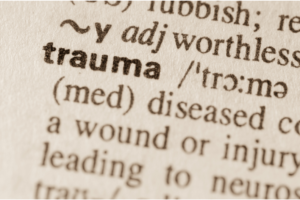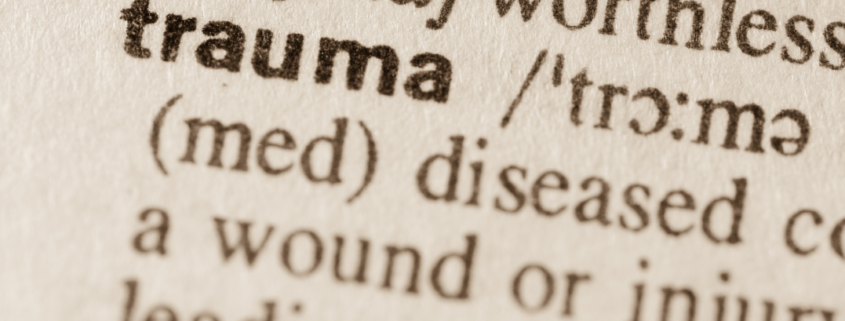Adverse Childhood Experiences
A note from Joanna
 Joe, a 57-year-old construction worker, had never missed a day on the job until a few months ago when he was diagnosed with lung cancer. Between the chemotherapy treatments and countless doctor’s appointments, Joe has found himself physically exhausted, emotionally depleted and unable to return to work. Joe has always prided himself for being tough and unflappable, but now he can hardly get through the day without shedding at least a few tears. He often chides himself for being weak, and can’t understand why he isn’t able to get through this like a real man.
Joe, a 57-year-old construction worker, had never missed a day on the job until a few months ago when he was diagnosed with lung cancer. Between the chemotherapy treatments and countless doctor’s appointments, Joe has found himself physically exhausted, emotionally depleted and unable to return to work. Joe has always prided himself for being tough and unflappable, but now he can hardly get through the day without shedding at least a few tears. He often chides himself for being weak, and can’t understand why he isn’t able to get through this like a real man.
Shortly after her husband of five years unexpectedly left her, 28-year-old Susie began having severe panic episodes. She worries about finances, whether she will ever have children, and cannot stop thinking about what she did to cause the demise of her marriage. Susie forces herself to go to work, but it takes everything out of her. She comes home exhausted and spends her evenings and weekends on the couch, binge-watching crime shows, drinking wine and eating junk food until 8pm when she finally allows herself to return to the comfort of her bed.
After working 45 years in the same school cafeteria, 68-year-old Doris recently retired and now spends her days smoking cigarettes on her back porch. Doris never had much to say to her co-workers and she chose not to marry or have children, so Doris is mostly alone. If you asked her, she would say she’s perfectly happy with her life, but inside, Doris feels isolated, hopeless and alone. She regularly tells herself that she is a failure. Lately Doris has developed a severe cough, and finds herself hoping it is something fatal so she can just be done with this miserable life.
Aside from the depression and anxiety symptoms, on the surface these three (fictional) individuals don’t seem to have a lot of similarities. But while they differ in age, circumstances and ways of coping with their circumstances, they do share one very specific thing in common.
Joe, Susie and Doris all experienced chronic childhood trauma.
***
Joe’s dad went to prison when Joe was 12. His mother worked long hours, and Joe was responsible for his two younger siblings after school. He helped with homework, bathed them and prepared dinner — his specialty was hot dogs and boxed macaroni and cheese. Joe didn’t have much time for his own activities, but his mother always thanked him and told him how much she appreciated him being “the man of the house.” Throughout his adolescence, Joe tried hard not to feel sorry for himself or compare himself to his much more carefree friends.
***
Throughout elementary school, Susie was bullied by two girls in her class who determined her to be “the weird smart girl.” She had a few friends, but the bullying took a major toll on her self-esteem. She always felt invisible, so when an incredibly handsome classmate asked her to homecoming her junior year, Susie was shocked. They began dating exclusively, but Susie still could not believe he chose her. She relished in the popularity she experienced as his girlfriend. When they got married a few years later, Susie felt like she had won the lottery.
***
Doris was an only child who grew up in a poor, working class neighborhood. Although her father worked very hard in a local factory, Doris’ mother spent her days at the casino, gambling and drinking. This was never discussed — her father hardly talked about much of anything, and when Doris’ mother was home, she was usually passed out on the couch. Doris had one close friend throughout her childhood, but they drifted apart in high school. Doris told herself she was a loner and didn’t need people. She started working at age 16 and prided herself in being a hard worker her bosses could always depend on.
***
So what does trauma have to do with it?
The ACE Study
In the mid-90’s, researchers from Kaiser Permanente and the CDC set out to see if negative childhood events such as household dysfunction or experiencing abuse or neglect correlated with physical and mental health problems later in life. Over several years, 17,000 individuals in the Kaiser Permanente health system were given questionnaires related to their childhood experiences and the state of their physical and mental health as adults.
Participants were asked whether they had experienced physical, sexual or emotional abuse, physical or emotional neglect, witnessed domestic violence, whether there was substance abuse or mental illness in the household, or whether parents/caregivers were divorced or incarcerated.
Surprisingly, more than half the individuals surveyed reported experiencing at least one of the events in question. The results of this massive study (one of the largest of its kind), led to the development of the Adverse Childhood Experiences (ACE) Questionnaire, one that is now commonly used to gain richer insight into an individual’s physical, social and emotional development.
Among many other findings, this study discovered that individuals who experienced 4 or more ACE factors in childhood had a significantly increased risk for myriad health problems including substance abuse, cancer, suicidal behavior, obesity, smoking, heart disease and depression.
Reasons are complicated, but the National Scientific Council on the Developing Child (Harvard University) theorizes that the “toxic stress” (chronic abuse, neglect or other stressful life events) caused by these adverse childhood experiences has a biological impact on a person’s ability to develop in an emotionally and physically healthy way.
This profoundly influences a person’s view of themselves, others and the world, the development of their emotion regulation system, their immune system, behaviors and lifestyle choices as well as their interpersonal relationships.
Why Does it Matter?
I give the ACE Questionnaire to just about everyone I work with, and those with high scores often shrug their shoulders. “So what,” they say. “I knew this. I’m fine. My hardships made me who I am.”
And while that’s partially true, many people who experienced chronic childhood trauma are extremely good at denying it, minimizing its impact or stuffing down any emotions they have about it. Thus, they often have poor insight as to how their experiences could be impacting their lives today.
My clients with childhood trauma often point out to me that they did not come to therapy to talk about their childhoods. They just want help for their anxiety, depression or relationship troubles. Plus, they tell me, they don’t have the time or the energy to dig up the past. It’s painful — why would they willingly do that to themselves?
Slowly I have to warm them to the idea that it does matter.
“We repeat what we don’t repair.”
This quote, most often attributed to Christine Langley-Obaugh, highlights the importance of slugging through the painful process of dealing with our pasts.
Whether we recognize it or not, unresolved negative childhood experiences are likely to pop up in just about every area of our lives. They impact our moods (irritable, defensive), behaviors (numbing, risky, addictive) and relationships (chaotic, unsatisfying, abusive). Our health, jobs and relationships are affected as the negative patterns established in childhood tend to repeat themselves in multiple ways over and over again.
(And don’t be deceived — even if you personally have a low ACE score, you are likely impacted. For example, the cost of trauma to tax-payers is estimated to be $458 billion dollars a year.)
It’s Complicated
Trauma is an incredibly complicated and draining personal, social and cultural issue, and there’s a lot to unpack.
For example, not everyone with adverse childhood experience is impacted in an overly negative way. In 2006, researchers in Maine developed a Resilience Questionnaire which highlights those factors that can help protect individuals against the negative impact of trauma.
Additionally, there are many treatments and interventions today that can help individuals heal from the past.
Aside from traditional talk therapy, interventions like EMDR, prolonged exposure therapy and specific types of cognitive behavior therapy can help individuals build tolerance to being exposed to traumatic memories, help them challenge and change negative beliefs about themselves and the world, and introduce them to new ways of coping with and accepting the difficult things that have happened to them.
For fictional people like Joe, Susie and Doris, and the millions of real individuals who suffer the effects of real trauma, there is hope. Stay tuned as we continue to talk about this important topic.
If you are in the Greenwood/Indianapolis, Indiana area and are interested in learning more about DBT, give us a call at 317-743-8202 or email [email protected]. Even if you’re not in the area and have questions, we would be glad to help if we can.

References
1. acesaware.org; https://www.acesaware.org/wp-content/uploads/2022/07/ACE-Questionnaire-for-Adults-Identified-English-rev.7.26.22.pdf
2. https://www.cdc.gov/violenceprevention/aces/index.html
3. https://developingchild.harvard.edu/
6. https://developingchild.harvard.edu/science/key-concepts/toxic-stress/
7. https://www.lanereport.com/157973/2022/07/op-ed-economic-costs-of-trauma-greater-than-you-think/#:~:text=Estimates%20vary%20on%20the%20total,estimated%20at%20%24458%20billion%20annually.
8. https://cls.unc.edu/wp-content/uploads/sites/3019/2016/08/From-ACESTOOHIGH-ACES-and-Resilience-questions.pdf


